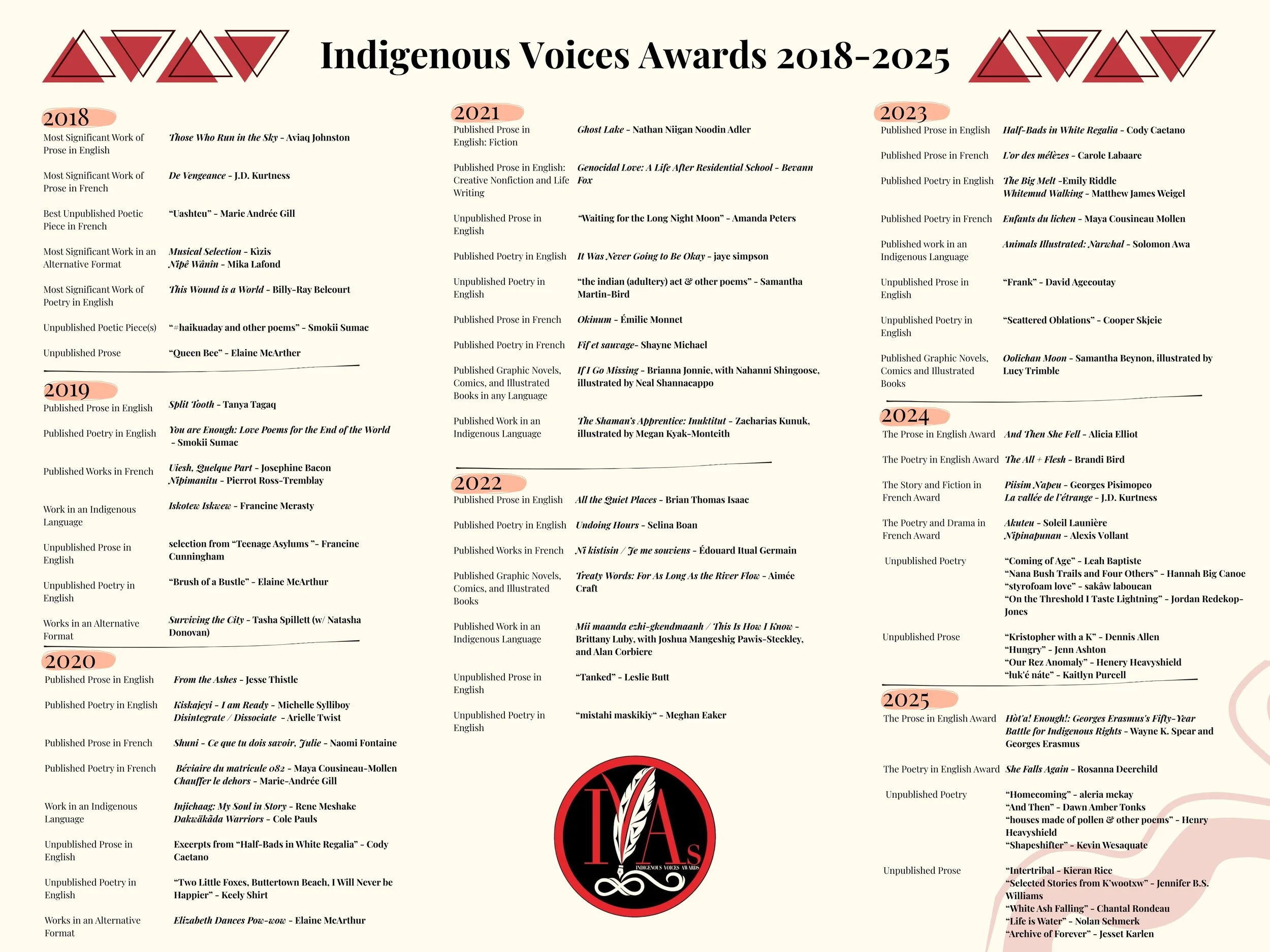The Indigenous Voices Awards
IVAs Background
The IVAs were established in 2017 to support and nurture the work of Indigenous writers in lands claimed by Canada. Funds for the awards were raised initially through a crowd-funded campaigns by Robin Parker and Silvia Moreno-Garcia, who partnered with ILSA for the awards’ administration. While an initial fundraising goal of $10,000 to support emerging Indigenous writers was set, the grass-roots initiatives raised $116,565 in four months. These monies have since been supplemented by further donations from various groups and individuals.
The Indigenous Voices Awards aim to support Indigenous literary production in its diversity and complexity. The awards honour the sovereignty of Indigenous creative voices and reject cultural appropriation; to be eligible for the Indigenous Voices Awards, authors must be Indigenous and must make a declaration of Indigenous identity. The awards are intended to support Indigenous artistic communities and to resist the individualism of prize culture. As such, the IVA Board will endeavour to create opportunities for mentorship, professionalization, and creative collaboration among applicants, jurors, and other members of the Indigenous artistic community when possible.
Each year, the number of prizes, their amounts, and their stipulations will be determined by the IVA Board based on the amount of money available in the Trust Fund, feedback from the Indigenous literary community, and reassessment of the campaign’s goals and objectives, with attentiveness to sustainability. The precise details of the awards will be subject to alteration based on decisions of the IVA Board, while ensuring the awards continue to support Indigenous literary arts and artists.
On “Emerging” and “Established” Writer
While for many people the category of “emerging writer” implies youth, the prize committee recognizes that there are Indigenous artists of diverse ages who are finding their voices as writers, including many older people and even quite a few Elders. Our definition of “emerging” is not focused on age but on the writer’s history of publication. For the purposes of these awards, “emerging” refers to writers who are thus far unpublished or who have published three books or fewer.
Notes:
Published work will be considered eligible for these prizes provided it either appeared on the market between January 1st and December 31st of the year in question or has an official publication date between January 1st and December 31st of the year in question.
The Indigenous Voices Awards Board
In 2025/2026 the IVAs Co-Chairs Billy-Ray Belcourt (Cree), Sophie McCall, and Deanna Reder (Cree-Métis) are administering the Published and Unpublished Prose and Published Poetry Awards in English. Coprésidentes Louis-Karl Picard Sioui (Kwahiatonhk!), Marie-Eve Bradette (Chaire de leadership en enseignement sur les littératures autochtones au Québec), and Alec Mahoney (coordinator), are working with Kwahiatonhk! to administer the French prizes.
Jurors Selection
The Jurors are selected by the IVA Board based on their esteem in the field of Indigenous literature, its production, and its study. A majority of the members on the Jury must be Indigenous. Juries must include published authors. Jurors must recuse themselves from the evaluation of submissions of work published by a press for which they are a paid employee, as well as any submissions upon which they have worked or consulted in the past (as editors, creative writing instructors, mentors, or otherwise). They must also recuse themselves from the evaluation of any submissions by family members or close friends. Jurors who work for literary presses must agree not to approach applicants to this competition in relation to the potential publication of their work submitted to the competition for a period of one year.
IVAs Impact
Over the course of eight award periods (2018-2025), the IVAs have had a significant impact on the Canadian literary landscape, elevating and championing the work of over 130 emerging Indigenous writers and building a community of supportive authors, publishers, academics, teachers, and readers.
Impact Highlights (2018-2025):
$247,000 in award money dispersed to emerging Indigenous writers;
Over 145 emerging writers shortlisted from Indigenous Nations across Turtle Island;
A Read Indigenous online resource currently listing over published works from past IVAs shortlists and published work from IVAs jurors;
Shortlists included early work from now-celebrated authors Joshua Whitehead, Billy-Ray Belcourt, Tanya Tagaq, Carleigh Baker, Tasha Spillett, Naomi Fontaine, and Phyllis Webstad;
Previous IVAs finalists in unpublished categories who went on to publish work include Francine Cunningham, Marie-Andrée Gill, Elaine McArthur, Smokii Sumac, Francine Merasty, and Cody Caetano.
